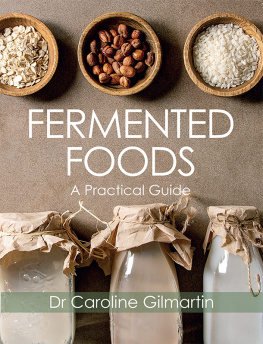PENGUIN PRESS
Published by the Penguin Publishing Group
Penguin Random House LLC
375 Hudson Street
New York, New York 10014

USA Canada UK Ireland Australia New Zealand India South Africa China
penguin.com
A Penguin Random House Company
First published by Penguin Press, an imprint of Penguin Publishing Group, a division of Penguin Random House LLC, 2015
Copyright 2015 by Justin Sonnenburg and Erica Sonnenburg
Penguin supports copyright. Copyright fuels creativity, encourages diverse voices, promotes free speech, and creates a vibrant culture. Thank you for buying an authorized edition of this book and for complying with copyright laws by not reproducing, scanning, or distributing any part of it in any form without permission. You are supporting writers and allowing Penguin to continue to publish books for every reader.
Photograph credits
Pages : Justin Sonnenburg, Jaime Dant, and Jeffrey Gordon
Page : Pascal Gagneux
Page : Kristen Earle and Justin Sonnenburg
ISBN 978-0-69818-1-021
Neither the publisher nor the author is engaged in rendering professional advice or services to the individual reader. The ideas, procedures, and suggestions contained in this book are not intended as a substitute for consulting with your physician. All matters regarding your health require medical supervision. Neither the author nor the publisher shall be liable or responsible for any loss or damage allegedly arising from any information or suggestion in this book.
Version_1
TO OUR DAUGHTERS, CLAIRE AND CAMILLE,
who provided the inspiration to write this book,
and
to our trillions of microbial inhabitantsmay your secrets continue to enlighten us for years to come.
FOREWORD
ANDREW WEIL, MD
In medical school in the mid-1960s I learned that the human colon contained a great many bacteria necessary for proper digestion and the assimilation of nutrients and that prolonged use of antibiotics could cause intestinal disturbances as a result of the overgrowth of undesirable organisms. In that era, people who ate yogurt for digestive health or took acidophilus supplements were labeled health nuts, and few medical authorities believed that gut flora had any influence outside of the gastrointestinal tract. There was no concept of a human microbiome that comprised all the microorganisms in and on the body, whose total DNA content was greater than that of human DNA.
Today, research on the human microbiome is one of the hottest areas of medical science, heralding a true revolution in our understanding of physiology and offering great promise for optimizing health and managing disease in novel ways. The species of bacteria and fungi that colonize the gut may determine our interactions with the environment, protecting us from or predisposing us to the development of allergy and autoimmunity. They may protect us from or predispose us to becoming obese or diabetic. They may inhibit or intensify inflammation in the body. They may interact with artificial sweeteners to cause insulin resistance and weight gain in some individuals. They may even influence mental function and emotional wellness.
I first heard about this new view of the microbiome from one of the authors of this book, Justin Sonnenburg. He and his wife, Erica, are prominent researchers in the field, directing their own lab in the Department of Microbiology and Immunology at Stanford University School of Medicine. In 2013, I had invited Justin to give a plenary talk on his research at the 10 th Annual Nutrition and Health Conference, organized by the University of Arizona Center for Integrative Medicine. The conference took place in Seattle and was attended by hundreds of physicians, registered dieticians, and other health professionals. Justins talk was the highlight of the event for me. It conveyed the excitement of discoveries about the human microbiome and suggested answers to puzzling questions I had about health conditions that are on the rise.
Asthma, allergies, and autoimmunity have all increased in North America and other developed areas of the world. Why is the incidence of peanut allergy so much greater today than it was when I grew up in the 1950s? And what is the explanation for the spectacular increase in gluten sensitivity?
That last question had bothered me greatly. Granted that gluten intolerance is a patient-driven diagnosis for which objective tests are lacking, there are still more and more people whose symptoms resolve when gluten is removed from their diet and reappear when it is added back. I reject the notion that grains in general and wheat in particular are bad foods, and I am unconvinced by the argument that the genetics of wheat have changed enough in recent years to be the cause. Gluten sensitivity seems to be most prominent in the North American population. In China, where isolated gluten is served at most restaurantsin such dishes as gluten with black bean sauce, and sweet-and-sour glutensensitivity to this protein is unknown, as it is in Japan. What has changed in North America that might explain it?
Justin Sonnenburg gave me the insight that alterations in our microbiome are likely to blame. Four factors have greatly changed gut flora in individuals in our population over the past few decades. They are: 1) increasing consumption of industrialized, processed foods, 2) widespread use of antibiotics, 3) the alarming rise in Caesarean deliveries, now accounting for one in every three births, and 4) the decline in breast-feeding. In this book you will learn how each of these has contributed to drastic alterations in the human microbiome and how those alterations may account for the increasing incidence of diverse chronic health conditions including autism, depression, and other mental/emotional disturbances.
The Sonnenburgs also discuss possibilities for typing the microbiome as a new diagnostic modality, and they examine the very important question of whether (and how) we might modify our microbiome to reduce disease risks and optimize health. How to do so is a very individual question, and the answer changes as you age. Should you take probiotic dietary supplements? Do they work? Which ones are most effective? What about fermented foods, so prominent in the diets of East Asians? (I believe we should be making and eating more of them.) This book tells you how to tackle all of these questions.
I consider this work essential reading for all health professionals and for everyone interested in a broader understanding of health and wellness. I am sure that you will come away from it with the same excitement that the authors and I feel over these new discoveries about the microorganisms that are so much a part of us.
Tucson, Arizona
October 2014
INTRODUCTION
We all know that much of our health is predetermined by our genes. We also know that we can generally improve our health if we eat right, exercise, and manage our stress. But how to do those things is a matter of great debate. Many well-meaning health programs are focused solely on weight loss or heart health, but what if there was another key to our overall health, a second, malleable genome that could influence our weight, our mood, and our long-term well-being? What if we could influence this genome by very specific (and often surprising) lifestyle choices? Well, this second genome exists. It belongs to the bacteria that inhabit our gut and is vital in countless ways to our overall well-being. The details of how this microbial community, known as the microbiota, is hardwired into health and disease are starting to come to light and they are reshaping what it means to be human.











